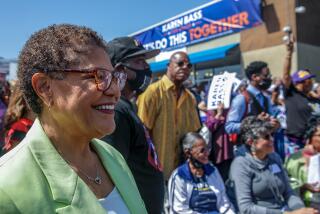Race Issue Has New Twist in Campaign to Unseat Helms
- Share via
CHARLOTTE, N.C. — Six years ago, when Harvey Gantt first tried to wrest Jesse Helms’ Senate seat away from him in North Carolina, he lost, many said, because of the color of his skin.
Helms unleashed a barrage of racially inflammatory television commercials as the close contest came to an end and defeated Gantt by 6 percentage points.
Now Gantt is trying again to unseat Helms, the Senate’s 74-year-old paragon of hard-line conservatism. But an unexpectedly strong bid from a fellow Democrat may keep the former mayor of Charlotte from getting a second chance. And once again, race is being identified as a factor working against him, but this time with a twist.
If Gantt loses the Democratic primary today--and the most recent poll suggests a close race--it may be because some black and liberal voters, intent on defeating Helms at any cost, turned to a white candidate they felt would have a better chance of doing that.
Early indications were that Gantt’s opponent, a former pharmaceutical chief executive named Charlie Sanders, had made inroads with the kinds of voters that supported Gantt in 1990 and that he had counted on this year.
The Sanders camp denies playing upon any racial dynamic; the candidate’s press secretary, Sallie Stohler, calls that assertion “absurd.” Still, a theme of his campaign is electability. His slogan is: “The one Democrat who can beat Jesse Helms.”
And some Gantt supporters worry that the racial issue has swayed some of those formerly in their corner. “There is a considerable amount of fear in the positions that some people are taking and not enough scholarship,” said Kelly Alexander, president of the North Carolina NAACP.
Alexander contends that the question of whether a black candidate can beat Helms is outdated. “North Carolina is evolving,” he said. “We walk upright now. Part of Jesse Helms’ appeal is rooted in a North Carolina that rapidly is ceasing to exist.”
*
A poll released late last week showed that Gantt’s lead over Sanders, which in February was 31 percentage points, has shrunk to 6 points, with a sizable chunk of voters still undecided. The poll also gave credence to Sanders’ electability claim: The survey showed him just 2 points behind in a matchup with Helms, while Gantt trailed the incumbent by 8 points.
In response to Sanders’ surge, Gantt has focused on consolidating his base among black politicians and activists, most of whom are now voicing their support for him. The recent poll of likely primary voters showed 76% of blacks back him, with the rest either for Sanders or undecided. That’s a good showing for Gantt, but to secure victory he may need undecided blacks to break strongly for him.
Among whites, Sanders leads, 53% to 29%.
The paramount issue for Democrats, both candidates agree, is Helms himself. The archconservative incumbent is a polarizing figure who inspires the allegiance of abortion foes, gun-control opponents, religious fundamentalists and other conservatives, but is anathema to civil rights proponents, environmentalists and supporters of federal arts funding.
“Forty-five percent of the voters will vote against Jesse Helms, no matter who the nominee is, and 45% to 48% will vote for Helms no matter who the nominee is,” said Stohler. “The key is who can appeal to the remaining voters.”
While Gantt, 53, and Sanders, 64, vie for the Democratic nomination, Helms has mystified observers with erratic campaign tactics. He attacked early, launching a commercial that sought to link both Gantt and Sanders to racial quotas and homosexual rights. But then Helms yanked the ad and fired the consultant responsible for it, the same consultant who devised his controversial 1990 ads.
An aide said the firing was caused by “a difference of opinion as to how to approach the campaign.”
*
While both Sanders and Gantt are moderates who agree on most issues, Sanders supports the death penalty, which Gantt opposes. Sanders, a former Harvard professor, is the retired head of the Glaxo USA pharmaceutical firm. He moved to North Carolina seven years ago.
Gantt, an architect, served two terms as mayor of Charlotte, the state’s largest city, in the mid-1980s. He was the first African American to hold that post and was the first black student to attend Clemson University.
As today’s vote approached, Gantt went on a two-week caravan trip that took him to 50 towns and cities. His aim, he said, was to address “real kitchen-table issues affecting hard-working people in this state.”
Sanders, who has given $1 million to his own campaign, hammered home in a widely aired TV spot his message that Gantt has little chance of defeating Helms. The ad repeats allegations Helms made in 1990 that Gantt is a tax-and-spend Democrat.
More to Read
Get the L.A. Times Politics newsletter
Deeply reported insights into legislation, politics and policy from Sacramento, Washington and beyond. In your inbox twice per week.
You may occasionally receive promotional content from the Los Angeles Times.










